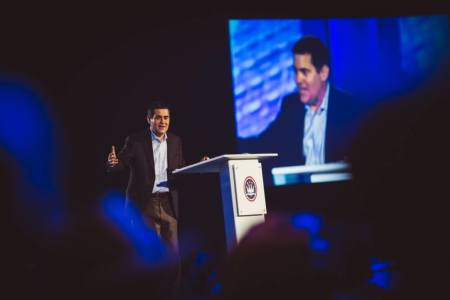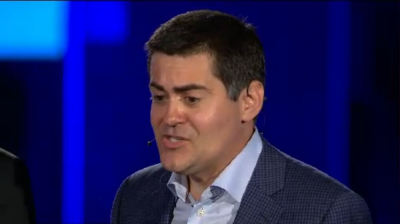Russell Moore: 'Politics Has Become a Religion in America'

Speaking on the gospel and cultural engagement at a national conference sponsored by the Southern Baptist Convention's Ethics & Religious Liberty Commission, Russell Moore complained that politics has become a religion and a source of identity for many evangelicals.

The over-promising that is taking place in the evangelical life in relation to electoral politics has been going on for several years, probably more than in the outside culture, said ERLC President Moore at a Saturday panel Q&A at the ERLC's 2016 national conference at the Gaylord Opryland Resort in Nashville, Tennessee.
He said he has heard the statement, "This is the most important election we have faced in my lifetime," from various people every election cycle over the years. And it's often said either we'll win or completely lose our country. This leads to two undesirable things, he added.
One, "the people who are with you become disillusioned and angry, 'Why don't we have all of the things you told us we would have?'" Two, some get burned-over and cynical because of the way the original sin and common grace interact with one another, due to which there are no final victories or final defeats, he explained.
Moore said he's concerned about "what happens to the witness of evangelicalism in the middle of the moment like this," especially as we are looking at a church that in the future is thankfully going to be multi-ethnic and multi-generational and also articulate in what it means to be a Christian.
"We have a responsibility not only to speak truthfully. But we have a responsibility to contextualize not only to the present culture but to the future," he said. "We have to speak in words that we can live with for future generations of evangelical Christians and our neighbors. And as we're doing that, ensuring the fact that the gospel is clear."
Politics across the board has become like a religion, a kind of a transcendent source of authority and identity, in America, Moore continued. Rather than seeing themselves as being part of a church or a movement or a community, people find their primary source of identity in where they are politically and who is with them politically and who's not with them politically.
When that's the case, it's very easy for the gospel "to be a tool to accommodate whatever political agenda is useful at the moment," Moore added. "Part of what we have to do is to dethrone politics as a religion and as a source of identity while at the same time remaining engaged in our responsibilities as citizens, in communities and neighbors, which includes the political process."
Donald Trump's presidential campaign was clearly on the minds of some of the conference speakers.
At the conference Friday, Moore, an outspoken critic of Trump, said, "Evangelicals, who have previously said character matters, who this year are saying character doesn't matter that much, are never going to be able to address the issue of character again. Never … For me the primary issue is not who's up and who's down in the horse race in 2016. It's what is the gospel witness of the evangelical church going to be in 2017 and 2018 and 2028 when you have this variety of problems."
He also said, "What do we do to rebuild after this debacle? Long term though, it could be that this nightmare of an election season is pressing some issues to the forefront and exposing some very real differences in terms of Christian witness and otherwise in this country that can productively lead us toward the future."
David French, a staff writer at National Review who has also strongly opposed Trump, in his keynote address called this year's election cycle a "colossal, miserable, disgusting failure" as voters will have to choose between Republican nominee Trump and Democratic nominee Hillary Clinton.
The SBC-sponsored conference, titled "Onward: Engaging the Culture Without Losing the Gospel," was aimed at helping believers to be "equipped to take the unchanging truths of the Bible and engage the shifting culture around us." The speakers included Matt Chandler, Andy Crouch, Bryan Lorries, Andy Stanley, Jackie Hill Perry and Gabe Lyons.





















